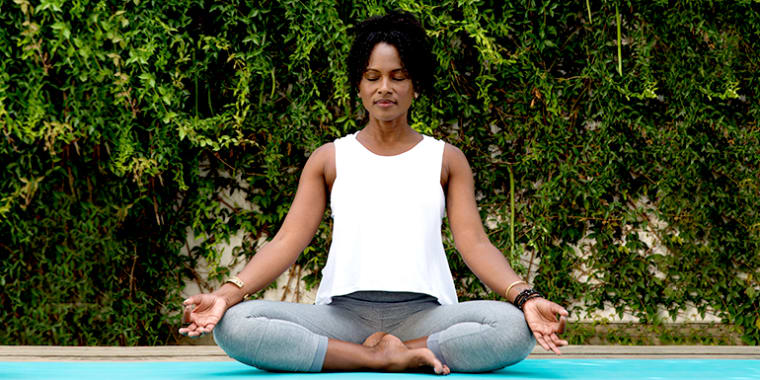
Breathing is key to sustaining life. From the moment we arrive on earth, it serves as the foundation of our existence. Research shows (this phrase is an inside joke in our family LOL) that conscious breathing can help reduce stress, regulate emotions, improve sleep, and reduce craving and addiction impulses. I always find that taking time to breathe calms my mind and supports my ability to think clearly.
There are a variety of breathing techniques to soothe and stimulate the mind and body. In the practice of yoga, these breathing techniques are called pranayama. This Sanskrit word basically means expanding and controlling the flow of the breath.
4 Yoga Breathing Techniques
You can do these at home, during your yoga practice, in your office, or wherever you need a few moments to decompress.1. Simple Breath Awareness
Simple breath awareness is a gentle diaphragmatic breathing technique that enables you to breathe more consciously and is a way to calm the nervous system, reduce stress, and enhance your awareness.How to: You can do this technique lying on your back, seated in a chair or on the floor in a cross-legged position. Close your eyes, place your hands on your stomach and begin to breathe at a normal pace in and out of your nose. Do this for one minute and observe the quality of the breath. Try your best not to judge how you are breathing–just observe. If you find your breath is tense or shallow, relax your body and pause at the beginning and the end of each breath. Continue this technique for another 2–4 minutes.
2. Ocean Breath (Ujjayi)
If done correctly, this breathing technique sounds like the sound of ocean waves. If your mind wanders, this technique can help bring your attention back to the moment if you focus on how your breath feels and sounds. Another purpose of this technique is to sync your movement with your breath, so your breath determines the pace in which you move during your yoga practice. Since this technique involves long, deep breathes it causes you to move more slowly and fluidly from one pose to the next.How to: Sit or stand and take deep inhalations and exhalations through the nose. Bring your hand in front of your face, palm facing you, and exhale onto your palm through the mouth as if you are fogging up a mirror. Keep your hand in front of your face and again try to “fog up the mirror,” but this time with your lips closed so that the air exhales through your nose. You will feel a slight constricting sensation in the back of your throat and hear a subtle rushing sound, similar to an ocean wave.
Bring your hand down to your side, close your eyes and continue breathing in through the nose normally, and out through the nose with the rushing sound. This technique has also been nicknamed “Darth Vader” breath, so as you incorporate this breath into your yoga practice, you can feel “the Force” and flow with ease. Next up: Jedi mind tricks.
3. Alternate Nostril Breathing (Nadi Sodhana)
This yoga breathing technique can be done when you need to center yourself.How to: Sit comfortably on the floor or in a chair and place your left palm face down on your left knee. With your right hand on your right leg palm faced up, fold your index and middle fingers into your palm. Leave the thumb, ring and pinky fingers extended out. Take a couple deep inhalations and exhalations.
•Place your right thumb over your right nostril. Inhale slowly up through your left nostril.
•Hold your breath and place your ring finger over your left nostril. Release the thumb, then slowly exhale out your right nostril.
•Keep your fingers as they are and inhale through your right nostril, place your thumb over your right nostril and hold your breath for a couple seconds.
•Release your ring finger then exhale out the left nostril.
That is one full cycle. Repeat 5–10 cycles with your eyes closed as you slowly alternate the inhale and the exhale. At the end, release the right palm to your right knee and enjoy the feelings of balance and ease.
4. Cooling Breath (Sitali)
This technique helps to improve focus and reduce “fiery” emotions such as agitation, anger, and anxiety.How to: Starting in a comfortable seated position, take a few deep breaths in and out of your nose, with an emphasis on slowing down the exhale. Then roll your tongue, curling the sides in towards the center to form a tube. If you can’t roll the sides of your tongue, purse your lips to create a small “o” shape with the mouth. Keeping your tongue or lips in this position, slowly inhale through your mouth and exhale through your nose. Repeat for 5–10 breaths.
No comments:
Post a Comment